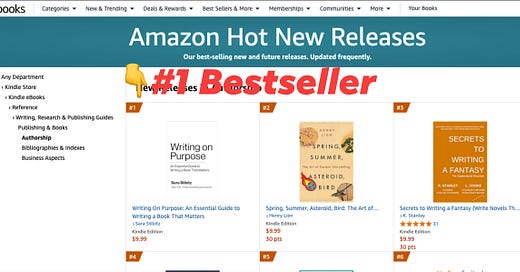I’m publishing a book. Writing on Purpose will be released on February 19. (You can pre-order the ebook here; if you want a physical copy, you can order on the date of release—and don’t worry, I’ll remind you!).
The other day, I shared this news on Facebook. I also shared the pre-order link.
Twenty-four hours later, I checked my Amazon page and saw a little orange flag.
I looked closer.
"#1 Bestseller."
To say I cackled is an understatement. After watching countless authors exhaust themselves chasing bestseller status—whether on the New York Times, Wall Street Journal, Amazon, or any other list—I had long decided it wasn’t worth the pursuit.
I’ve always told the authors I work with: “Bestseller” doesn’t mean “good book.” It simply means a book has hit the threshold for that status—nothing more.
And yet, here I was, now able to slap the “bestseller” title on my book and marketing materials if I wanted.
Why Does It Matter?
Being a "bestseller" still holds weight. It adds credibility, boosts an author’s authority, and makes readers assume the book is valuable. For self-published and hybrid authors, it can feel like a golden ticket to more sales and legitimacy.
But here’s the truth: Bestseller lists—especially Amazon's—can be gamed.
When you upload a book to Amazon, you pick up to three categories where it will be listed. If you want to "win" bestseller status, you choose at least one obscure category with little competition. Then, with a small but well-timed spike in sales, you hit #1.
I had no intention of doing this. But I accidentally did.
I originally chose broad, high-level categories. But when I uploaded the digital version, the same categories weren’t available. After a few clicks, I ended up in “Authorship.” I shrugged and moved on.
A day after I shared my Facebook post, I hit the #1 bestseller list under "Authorship."
As soon as I’d noticed I hit the list, I checked my preorders.
13.
Just 13 preorders got me there.
Since then, I’ve had more, but at the moment I hit the list? That was all it took.
The Fleeting Nature of Bestseller Status
Amazon bestseller status is temporary—a moving target based on real-time sales in your chosen category. That’s why authors take screenshots while they can.
This practice is incredibly common, though not everyone who claims “Amazon Bestseller” status has manipulated their way onto the list. But make no mistake—there are services that do game the system. They’ll:
- Price books at $0.99 to drive volume
- Use email lists (real or not) to boost sales
- Strategically time sales pushes
- Select categories designed for easy wins
Others have written great pieces about this, and I’ll talk more about how the other lists are gamed in future posts.
Just remember: bestseller status can mean many things, but the real measure of a book’s value isn’t a badge—it’s the impact it has on its readers.






Congrats on this unplanned and amazing win!! 💕 I’m excited to read mine when it launches.